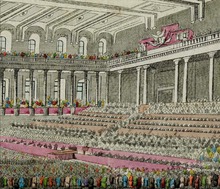The Alexanderfest
The Alexanderfest ( HWV 75) is an ode in honor of St. Cäcilia for solos , choir and orchestra by Georg Friedrich Händel . The English title of the work is: Alexander's Feast; or, the Power of Music ("Alexander's festival or: the power of music"). The text was arranged by the English poet Newburgh Hamilton after an ode by John Dryden from 1697. The first performance took place under the direction of the composer on February 19, 1736.
Work history
Handel probably began composition at the end of 1735. He completed the first part on January 5, the second on January 12, 1736, and then needed five days for various revisions. The premiere took place on February 19, 1736 at the Covent Garden Theater in front of 1,300 people. Between the acts, Handel played the Concerto grosso in C major (HWV 318), which remained associated with the name Alexanderfest . The vocal soloists were Anna Maria Strada ( soprano ), Cecilia Young (soprano), John Beard ( tenor ), Mr. Erard ( bass ). There was a second performance in the presence of the whole court on February 25, 1736. Further performances followed on March 3, 12 and 17 of that year. Since then the work has been performed almost annually.
During and after Handel's lifetime, the oratorio was one of his most popular. Wolfgang Amadeus Mozart re- orchestrated it in 1789 on behalf of the prefect of the Imperial Court Library in Vienna, Baron Gottfried van Swieten ( KV 591). Mozart's work was not performed for the first time until after his death in 1793, but then became the standard version in German-speaking countries during the 19th century.
Mozart's version in an adaptation that was again both lyrically and musically (by Ignaz von Mosel ) was also published in Vienna in 1812 under the title Timotheus or the violence of music at an event known at the time as a "Monstre Concert" with around 600 participants in the winter riding school presented, which ultimately represented the impetus for founding the Society of Friends of Music in Vienna .
libretto
The seven-stanza poem Alexander's Feast; or, the Power of Music (A song in honor of St. Cecilia's day) was written by John Dryden in 1692 and published in 1697. In it Dryden celebrates a festival that Alexander the Great celebrated after his victory in 330 BC. In the conquered city of Persepolis. This historical fact has been passed down through Plutarch . Newburgh Hamilton is named as the actual librettist for Handel's work, but his work is essentially limited to dividing the poetry into recitatives, arias and choruses. He added some verses from his own ode The Power of Musick from 1720 to Dryden's poetry, but Handel did not use them in all versions. Even before Alexander's Feast , Dryden had written another Cäcilienode. Henry Purcell set it to music in 1692, and in 1739 Handel wrote his Ode for St. Cecilia's Day about the poetry .
Karl Wilhelm Ramler created a German translation in 1766, which he revised in 1770 and published in his Lyric Poems in 1772 .
Sound carrier
- GF Handel (arr .: Mozart / Mosel): Timotheus or the violence of music ( Concentus Musicus Wien , Wiener Singverein - Nikolaus Harnoncourt )
Web links
- Alexander's Feast, HWV 75 (Handel, George Frideric) : Sheet music and audio files in the International Music Score Library Project
- Score from Alexander's Feast (Handel work edition) ed. v. Friedrich Chrysander , Leipzig 1861
- Handel's Alexander Festival in an arrangement by WA Mozart, KV 591, ed. by Andreas Holschneider: Score and critical report in the New Mozart Edition
literature
- Leo Schrade : Studies on Handel's "Alexander Festival". In: Handel yearbook. Vol. 5, 1932, ISSN 0440-0615 , pp. 38-141.
- Hans Joachim Marx : Handel's oratorios, odes and serenatas. A compendium. Vandenhoeck & Ruprecht, Göttingen 1998, ISBN 3-525-27815-2 .
- Albert Scheibler, Julia Evdokimova: Georg Friedrich Händel. Oratorios guides. Edition Cologne, Lohmar 1993, ISBN 3-928010-04-2 .
- Winton Dean : Handel's Dramatic Oratorios and Masques. Clarendon Press, Oxford et al. 1990, ISBN 0-19-816184-0 (English).
Individual evidence
- ↑ Londern Daily Post , 1736. February 20, German translation by: Friedrich Chrysander : GF Handel. 2nd volume. Breitkopf and Härtel, Leipzig 1860, p. 426 f.
- ↑ Till Gerrit Waidelich: Timotheus in the winter riding school on November 29, 1812. ( Memento of the original from April 16, 2015 in the Internet Archive ) Info: The archive link was automatically inserted and not yet checked. Please check the original and archive link according to the instructions and then remove this notice.
